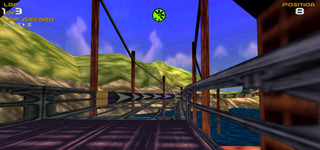Wipeout's now remastered and playable in a browser, coder tells Sony to 'either let it be, or get a real remaster going'
"I would have loved to work this into an officially sanctioned remaster [but] here we are."

Just over a month ago we reported on the sudden re-emergence of a shined-up PC version of 1995's Wipeout, a launch title for Sony's first PlayStation and a game that set the tone for the entire platform: cool, slick, and fast as hell. It came from an anonymous hero who, under the Github account Wipeout Phantom Edition, released an enhanced PC source port of the original Wipeout under that subtitle of Phantom Edition: "It uses game data from the PlayStation version and is much more comparable to the PlayStation version than the official PC port" (which I haven't played but is apparently not a great port).
This was based on a 2022 leak of the original game's source code from Forest of Illusion, and the Phantom Edition modder wasn't the only person with their eye on it. Where Phantom Edition required some work to be playable, one Dominic Szablewski has now used that source leak to rewrite the entire game (or as he puts it, "everything everywhere"), document the process, release it on Github and, for good measure, make it playable in a browser.
"Neither the Phantom Edition nor XProger's version [another Wipeout remaster project] come with the source code," says Szablewski. "Understandably so. The legality of re-distributing the leaked source is questionable at best. So let's just pretend that the leak was intentional, a rewrite of the source falls under fair use and the whole thing is abandonware anyway."
Szablewski adds that "I would have loved to work this into an officially sanctioned remaster, but as you can imagine getting a hold of anyone at Sony is impossible. So here we are."
The coder goes into some detail on the actual contents of the leak, which seemed mostly to come from Wipeout ATI 3D Rage Edition, a "lackluster port" bundled with ATI GPUs. It's a mess of code from different versions of the game glommed-together that, unsurprisingly, suffers some performance issues.
"The code may not be pretty, but the result justifies it all," said Szablewski. "It was a launch title for the PSX and it still holds up today. The developers faced the unknowns of never before seen hardware and 3D was a whole new dimension to make sense of. They did a tremendous job [...] In the end it was a management decision to produce something that could be sold, instead of producing something good."
As an example, Szablewski cites the title screen: "It's 5000 lines of spaghetti for the main menu plus another 4000 or so for the in game menu, credits (without the actual text) and win/lose screens. I threw this all away."
The biggest gaming news, reviews and hardware deals
Keep up to date with the most important stories and the best deals, as picked by the PC Gamer team.
The documentation goes into great detail on the specifics of coding on PlayStation and how Szablewski ended up pruning 40,699 lines of code down to 7,731 and had an "absolute blast" doing it. And now you can have a blast playing it: this thing works beautifully in the browser and hits that exact note of being the game you remember but better, smoother, and with a much higher framerate.
Szablewski ends by addressing the elephant in the room, Sony itself, which has shown a lack of interest in Wipeout in recent times and certainly no desire to keep the older games available. In a better world, needless to say, Sony would give this man a check and stick this up on Steam, but we don't live there.
"Sony has demonstrated a lack of interest in the original Wipeout in the past, so my money is on their continuing absence," said Szablewski. "If anyone at Sony is reading this, please consider that you have (in my opinion) two equally good options: either let it be, or shut this thing down and get a real remaster going. I'd love to help!"
Rich is a games journalist with 15 years' experience, beginning his career on Edge magazine before working for a wide range of outlets, including Ars Technica, Eurogamer, GamesRadar+, Gamespot, the Guardian, IGN, the New Statesman, Polygon, and Vice. He was the editor of Kotaku UK, the UK arm of Kotaku, for three years before joining PC Gamer. He is the author of a Brief History of Video Games, a full history of the medium, which the Midwest Book Review described as "[a] must-read for serious minded game historians and curious video game connoisseurs alike."
Most Popular






